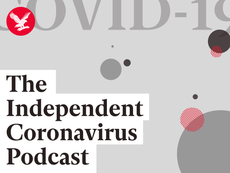Humanity’s exploitation of wildlife is putting us all at risk
Bringing animal trafficking under control must be an international priority in the wake of coronavirus

Alongside my disbelief, horror and sadness at the spread of the Covid-19 pandemic, my main emotions are anger and frustration. Frustration that the pandemic we are living through was predictable and preventable.
We’ve spoken many times about the roots of Covid-19 in the wildlife trade and the importance of investing in research into zoonotic diseases. It is no comfort to me now that the Zoological Society of London (ZSL) has been campaigning for much greater focus by governments and businesses on both these areas for many years.
Humanity’s relentless exploitation of wildlife has been putting us at increasing risk of an event like this for decades. And this knowledge has not been some big secret, despite the rhetoric from various world leaders claiming this pandemic couldn’t have been anticipated. The truth is, we knew this was coming. Not just scientists and conservationists. Even Hollywood knew this was coming; check out the movie billboards from 2011, advertising the film Contagion, which followed the rapid progress of a lethal virus that passes from a pig, infected by a bat, to humans in a Chinese live animal wet market.
Experts believe the Covid-19 virus spilled over from an animal host to a human in a wet market in Wuhan, China, sometime late last year. Perhaps the prime example of human overexploitation of wildlife, animals in these markets are taken from the wild, brought together from different places, transported over large distances and crammed together into cages. By this stage, they are stressed and immunosuppressed and so excrete whatever pathogens they have in them while also being increasingly vulnerable to infections they might not naturally encounter. People, who are in intimate contact with the body fluids of slaughtered animals, are also exposed to novel pathogens, creating the ideal environment for new diseases to emerge.
Closing the markets seems like one simple, quick decision. But that doesn’t account for the scores of people, often living in poverty, who rely on these types of markets for their sustenance, their income – their lives. Simply banning or closing wet markets where wildlife is sold would leave millions of people in the developing world without a vital source of nutrition. It can never be a long-term solution. But, unregulated – often illegal – wildlife trade exposes humanity to dangerous diseases like Covid-19, drives species to extinction, and funds organised crime.
In response to the coronavirus crisis, instead of knee-jerk bans that would be impossible to enforce and potentially drive trade underground, we need significant investment in wildlife health research, its application and improved regulation of wildlife markets. With investment, we can build a strong understanding of the risk factors associated with zoonotic disease emergence and how we can support communities to take action to prevent the horrendous impacts of these diseases they have experienced. Coming out of this crisis, we need to focus on recovery strategies that reduce zoonotic disease spill-over, better conserve nature and restore the valuable protection against diseases that ecosystems provide.
Battling the illegal and unsustainable wildlife trade has long been core to our field conservation and policy work, and bringing wild animal trafficking under control must be an international priority in the wake of coronavirus. Leading ZSL, I am confronted daily with the impact of the havoc being wrought on wildlife. The numbers scare me. Some 100 million sharks killed every year, mostly for their fins; 20,000 African elephants slaughtered annually for their ivory; more than 1,000 rhinos poached every year from South Africa alone since 2013. Take a longer view and you see the indiscriminate scale of the destruction; in ZSL’s Living Planet Index, we’ve tracked a 60 per cent decline in the size of wildlife populations since 1970. Today, one million species are threatened with extinction.
Trafficking isn’t just a problem for the rest of the world, nor one that doesn’t touch us here in the UK. Since 2000, we’ve provided homes at ZSL London Zoo for 3,370 animals confiscated by the UK’s Border Force, including Egyptian tortoises, red rain frogs, green tree pythons and hundreds of corals. We recently gave a home to Professor Lew, a critically endangered Chinese giant salamander smuggled into the UK in, of all things, a cereal box.
Wildlife health and human health go hand in hand. As this coronavirus outbreak has demonstrated – with tragic consequences – the way we interact with wildlife has ramifications for us all. As we emerge from the Covid-19 pandemic, with its enormous human and economic impacts, we must ensure there is a fundamental rethink of the relationship between humans and wildlife. We can’t let a temporary clearing of the smog over London, Delhi or Beijing, or a brief resurgence of wildlife in densely populated areas, be the only positives to emerge from global lockdown.
Part of what ZSL is about, now and after the lockdown, is helping to make sure that a return to business as usual in humanity’s relationship with nature, which got us here in the first place, is just not an option. We simply cannot afford to go back to old habits and old ways – for the sake of human health, of wildlife health and the future of our ecosystems.
Dominic Jermey is director-general of ZSL. The Independent’s Stop the Wildlife Trade campaign calls for an international effort to tighten restrictions on wet markets to reduce the risk of future pandemics.






Join our commenting forum
Join thought-provoking conversations, follow other Independent readers and see their replies